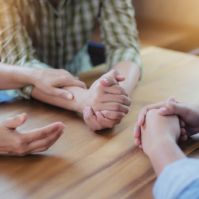 _"Keep in mind that to avoid loneliness, many people need both a social circle and an intimate attachment. Having just one of two may still leave you feeling lonely." Gretchen Rubin_
_"Keep in mind that to avoid loneliness, many people need both a social circle and an intimate attachment. Having just one of two may still leave you feeling lonely." Gretchen Rubin_
Those without friends and family at the holidays often feel lonely during the winter season. Even those who are surrounded by family and friends might feel isolated and alone, simply because they aren't connected to others. Researchers have connected social connectedness to physical health many times. It's been suggested that those who are socially isolated have an increased risk of a heart attack or stroke. Just recently, Harvard researchers released a new study showing that how many close friends and family a person has relates to the level of a blood clotting protein which increases the risk of heart conditions.
Fibrinogen is a protein in your body that clots your blood. Too much fibrinogen leads to high blood pressure and blocked arteries. This protein accumulates when your body goes into stress mode. The "fight or flight" response in your brain that tells you something is wrong causes build-up of this protein. Harvard scientists discovered a direct correlation between high levels of fibrinogen and low levels of social connectivity. In some people who had less than 20 close friends and family, the levels of fibrinogen were just as high as those who smoked. These researchers believe that loneliness is just as bad for your health as if you smoked cigarettes each day.
Why Are You Lonely?
Loneliness isn't always simply being alone. In order to find a solution to your loneliness, you need to figure out whether you need more people or simply need to connect to those you already know. If you're feeling lonely, think about when you feel alone and why. Maybe track the times you are feeling this way. Then ask yourself what's changed from times when you weren't lonely. We all go through seasons in our lives when we forget to connect to others. It might be grief, busyness or illness in your own life. It might be that you need to make more meaningful connections with people. If you can't pinpoint your problem, you can always talk to a professional counselor or your religious leader.
Dealing With Your Loneliness
When you're feeling lonely, you have to take steps to overcome it. It might feel uncomfortable to tell someone that you're feeling alone, but no one can read your mind. When you reach out and share your emotions, you're taking initiative in dealing with your loneliness. If you don't feel as if you can talk to a friend or a family member, talk to your spiritual leader or a therapist. Just ask for help.
Instead of dwelling on your lack of friends or connections, just make yourself do something to stay busy. Take a class. Play sports. Try new hobbies. Go places. Learn to enjoy life. This experience gives you a basis to make connections with others when you do talk to someone. Don't just attend a function to meet people. Go have fun, no matter who you talk to and meet. When you appear interested in an activity, you will draw people to you.
Take initiative and talk to others. Be yourself when you start making friends. You don't want to misrepresent yourself. Learn to be a good listener. People respond to those who really pay attention to what they're saying. This makes them feel as if you care. Be positive and complimentary. You want to be enjoyable company. Be authentic and show you are a good friend. You'll start making better connections when you try. Remember those who might be lonely themselves. Reach out and make a new friend this year for your health.



